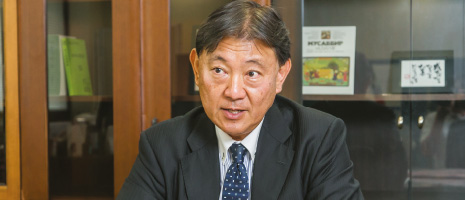Home > Highlighting JAPAN > Highlighting Japan September 2018 > A Society of Health and Longevity
Highlighting JAPAN


Making a Society of Health and Longevity a Reality
Japan is one of the rare countries where extended human longevity is a widespread reality. We asked Vice-Minister for Health, Chief Medical & Global Health Officer of the Ministry of Health, Labour and Welfare Yasuhiro Suzuki to describe the global value, methods and goals of Japan’s society of health and longevity.
How does the world assess Japan as a society of health and longevity?
Japan boasts a combined average life and health expectancy that is the highest in the world, made possible by the Japanese dietary habits, exercise and high levels of medical care. Many countries are therefore focusing on Japanese food and lifestyle that makes this a possibility. Despite Japan having the most elderly population among OECD countries, our social security expenditures are low. Another international point of value is that Japan’s social security system performs well despite those limited expenditures.
Twenty-five years after World War Two, the speed at which Japan was aging had accelerated, and the number of elderly doubled. This occurred in a quarter of the time it took Europe to do the same. Such a drastic change has its pros and cons, which is why Japan has been serving as a great example for other nations through its knowledge and lessons learned about aging populations.
Japan has become an aging society at an unbelievable speed. Does that present any specific challenges?
We have to acknowledge the westernization of the Japanese people’s diet, the increase of salt in Japanese cuisine, stress, and the unhealthy habits of modern society. And unlike before, households changed from multiple generations living under one roof to nuclear families living apart. Having locals or private companies watching and caring for the elderly living alone is also a challenge. These are other lessons learned from our fast-aging society.
One of the biggest challenges was to secure the financial resources for the increasing social security budget. Japan’s policies have proven successful in controlling this budget—which could easily become expensive—with the help of many sectors.
Are there any specific measures being taken to foster a society of health and longevity?
As the Ministry of Health, Labour and Welfare, we have presented several ideas. First is exercise. For instance, we suggest that people get off one station before their own and walk home from there, or at least walk ten minutes a day. Next are meals. We suggest people eat more vegetables and cut down on the consumption of salt and fatty foods. Lastly, the Health Promotion Law has helped strengthen measures against passive smoking.
Japanese people are said to be healthy, but we also have three of the main lifestyle-related diseases: hyperlipidemia, diabetes, and high blood pressure. We are warning people to be more aware of lifestyle-related diseases and get regular checkups. Rest is also important to hard-working Japanese. We would like people to be aware of both the length and the quality of sleep they are getting.
What kind of society of health and longevity do you hope to create, and what should individuals do to reach that goal?
Self-direction is the key. While wearable devices that can easily measure and display a person’s health status are gradually becoming popular and have increased awareness, we need businesses and society to support self-control. An ideal society has places where exercising is easy, and you can see calorie counts at every restaurant. Companies need to encourage employees to raise their awareness of health, promote healthy working hours and changes in work habits, and find ways to increase employee motivation that will inspire seniors to continue working after retirement. As medical technology advances, even patients with incurable diseases may be treated as outpatients, working without being hospitalized. We will have a lifestyle where people can be treated in the morning and go to work in the afternoon. To make this a reality, the support of companies will be indispensable. In this way, people will become more conscious about their health, and society will achieve a state of healthy longevity.
© 2009 Cabinet Office, Government of Japan






